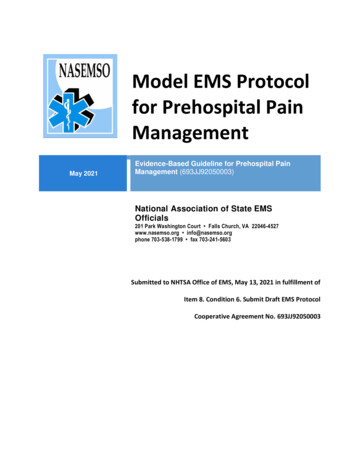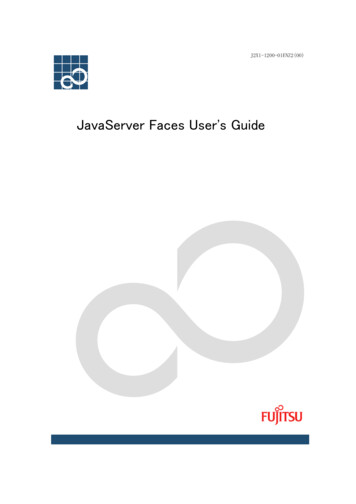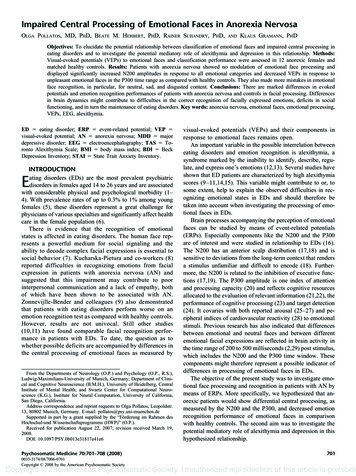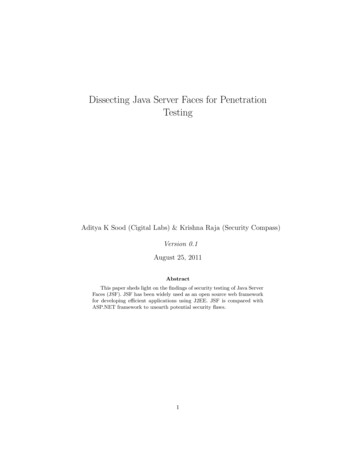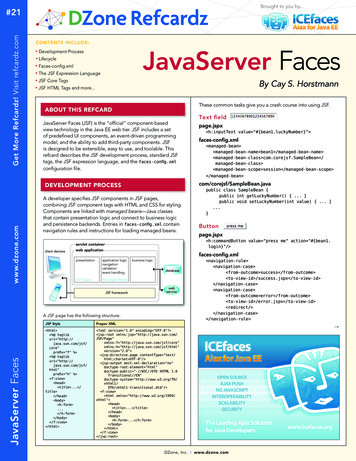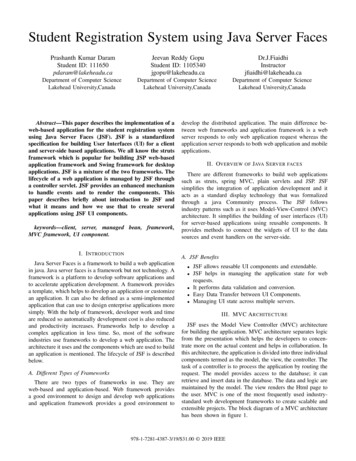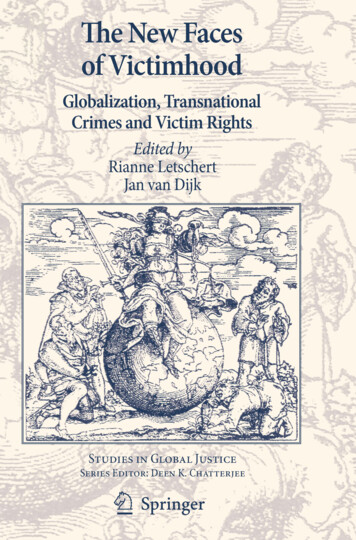
Transcription
The New Facesof VictimhoodGlobalization, TransnationalCrimes and Victim RightsEdited byRianne LetschertJan van DijkStudies in Global JusticeSeries Editor: Deen K. Chatterjee13
THE NEW FACES OF VICTIMHOOD
STUDIES IN GLOBAL JUSTICEVOLUME 8Series EditorDeen K. Chatterjee, University of Utah, Salt Lake City, UT, U.S.A.Editorial BoardElizabeth Ashford, University of St. Andrews, U.K.Gillian Brock, University of Auckland, New ZealandSimon Caney, Oxford University, U.K.Michael Doyle, Columbia University, U.S.A.Andreas Follesdal, University of Oslo, NorwayCarol Gould, Temple University, U.S.A.Virginia Held, CUNY, U.S.A.Alison Jaggar, University of Colorado, U.S.A.Jon Mandle, SUNY, Albany, U.S.A.Onora O’Neill, The British Academy, U.K.Sanjay Reddy, Columbia University, Barnard College, U.S.A.Henry Shue, Oxford University, U.K.Kok-Chor Tan, University of Pennsylvania, U.S.A.Leif Wenar, University of Sheffield, U.K.Veronique Zanetti, University of Bielefeld, GermanyAims and ScopeIn today’s world, national borders seem irrelevant when it comes to international crimeand terrorism. Likewise, human rights, poverty, inequality, democracy, development, trade,bioethics, hunger, war and peace are all issues of global rather than national justice. Thefact that mass demonstrations are organized whenever the world’s governments and politicians gather to discuss such major international issues is testimony to a widespread appealfor justice around the world.Discussions of global justice are not limited to the fields of political philosophy and politicaltheory. In fact, research concerning global justice quite often requires an interdisciplinaryapproach. It involves aspects of ethics, law, human rights, international relations, sociology,economics, public health, and ecology. Springer’s new series Studies in Global Justice upthat interdisciplinary perspective. The series brings together outstanding monographs andanthologies that deal with both basic normative theorizing and its institutional applications.The volumes in the series discuss such aspects of global justice as the scope of social justice,the moral significance of borders, global inequality and poverty, the justification and contentof human rights, the aims and methods of development, global environmental justice, globalbioethics, the global institutional order and the justice of intervention and war.Volumes in this series will prove of great relevance to researchers, educators and students, aswell as politicians, policy-makers and government officials.For further volumes:http://www.springer.com/series/6958
The New Faces of VictimhoodGlobalization, Transnational Crimesand Victim RightsEdited byRIANNE LETSCHERTTilburg University, The NetherlandsJAN VAN DIJKTilburg University, The Netherlands123
EditorsDr. Rianne LetschertInternational VictimologyInstitute (INTERVICT)Tilburg UniversityPO Box 901535000 LE TilburgNetherlandsR.M.Letschert@uvt.nlProf. Jan van DijkInternational VictimologyInstitute (INTERVICT)Tilburg UniversityPO Box 901535000 LE TilburgNetherlandsJan.vanDijk@uvt.nlISSN 1871-0409ISBN 978-90-481-9019-5e-ISBN 978-90-481-9020-1DOI 10.1007/978-90-481-9020-1Springer Dordrecht Heidelberg London New York Springer Science Business Media B.V. 2011No part of this work may be reproduced, stored in a retrieval system, or transmitted in any form or byany means, electronic, mechanical, photocopying, microfilming, recording or otherwise, without writtenpermission from the Publisher, with the exception of any material supplied specifically for the purposeof being entered and executed on a computer system, for exclusive use by the purchaser of the work.Printed on acid-free paperSpringer is part of Springer Science Business Media (www.springer.com)
PrefaceThis volume originated from a shared interest of different senior and junior membersof Tilburg Law School in analysing victimization by crime from different angles.When the idea came up to combine our mutual research interests, it became clearthat in each and everyone’s research field, processes of globalization increasinglyposed new complexities and questions that have not yet been sufficiently addressed.Our discussions started somewhere in 2007, leading ultimately to a common themeof globalization, transnational crimes and victim’s rights.The authors are all research fellows or staff members of the InternationalVictimology Institute, a research institute in The Netherlands focusing on interdisciplinary research on victims that can contribute to a comprehensive, evidence-basedbody of knowledge on the empowerment and support of victims of crime and abuseof power. We thank our colleagues for their willingness to cooperate in this bookproject and their patience in awaiting the final result.This volume is part of the series ‘Studies in Global Justice’ of SpringerPublications. We thank the series editor, Prof. Deen Chatterjee as well as the independent peer reviewers for their thoughtful and insightful remarks to the first draftof the manuscript.We furthermore express our appreciation to Neil Olivier and Diana Nijenhuijzenfrom Springer Publishing in assisting us in the final preparation of the book.Lastly, we wish to thank Hedwig Suurmeijer for the English editing of the book.Tilburg, The NetherlandsRianne LetschertJan van Dijkv
ContentsPart IIntroductions and Overviews1 New Faces of Victimhood: Reflections on the Unjust Sidesof Globalization . . . . . . . . . . . . . . . . . . . . . . . . . . . .Rianne Letschert and Jan van Dijk32 Global Governance and Global Crime – Do Victims Fallin Between? . . . . . . . . . . . . . . . . . . . . . . . . . . . . . .Rianne Letschert and Marc Groenhuijsen153 Human Security and the Emergenceof a Global Conscience . . . . . . . . . . . . . . . . . . . . . . . .Ralf Bodelier41Part IIVictims of Transnational Crimes4 Trafficking for Sexual Purposes as a Globalized ShadowEconomy: Human Security as the Tool to Facilitatea Human Rights Based Approach . . . . . . . . . . . . . . . . . .Conny Rijken and Renée Römkens735 Transnational Organized Crime, Civil Societyand Victim Empowerment . . . . . . . . . . . . . . . . . . . . . .Jan van Dijk996 Victims of Environmental Pollution in the Slipstreamof Globalization . . . . . . . . . . . . . . . . . . . . . . . . . . . .Jonathan Verschuuren and Steve Kuchta127Part III Victim Protection in Cyberspace7 The Challenge of Identity Theft in Multi-LevelGovernance: Towards a Coordinated Action Planfor Protecting and Empowering Victims . . . . . . . . . . . . . .Nicole van der Meulen and Bert-Jaap Koops159vii
viiiContents8 International (Cyber)Stalking: Impedimentsto Investigation and Prosecution . . . . . . . . . . . . . . . . . . .Suzan van der Aa1919 Digital Tools: Risks and Opportunitiesfor Victims: Explorations in E-victimology . . . . . . . . . . . . .Corien Prins215Part IV Victims of Conflicts and Wars10 Al Qaeda and Vicarious Victims: Victimological Insightsinto Globalized Terrorism . . . . . . . . . . . . . . . . . . . . . .Antony Pemberton11 Protecting the Victims of the Privatization of War . . . . . . . . .Willem van Genugten, Marie-José van der Heijden, and Nicola Jägers12 Globalization and Victims’ Rights at the InternationalCriminal Court . . . . . . . . . . . . . . . . . . . . . . . . . . . .Jo-Anne Wemmers and Anne-Marie de BrouwerPart V233253279Conclusion13 Reconstructing Victim-Centered Justice on a Global Scale . . . .Jan van Dijk and Rianne Letschert303References . . . . . . . . . . . . . . . . . . . . . . . . . . . . . . . . . .319Index . . . . . . . . . . . . . . . . . . . . . . . . . . . . . . . . . . . . .341
ContributorsSuzan van der Aa Senior researcher at INTERVICT, Tilburg University, Tilburg,The Netherlands, S.vdrAa@uvt.nlRalf Bodelier Research Fellow at Intervict, Valentijnstraat 19, 5014KE Tilburg,ralf.bodelier@gmail.comAnne-Marie de Brouwer Tilburg University, Department of Criminal Law,PO Box 90153, 5000 LE, Tilburg, The Netherlands, A.L.M.deBrouwer@uvt.nlJan van Dijk International Victimology Institute (INTERVICT), TilburgUniversity, 5000 LE Tilburg, The Netherlands, Jan.vanDijk@uvt.nlWillem van Genugten School of Law, Tilburg University, 5000 LE, Tilburg, TheNetherlands, w.j.m.vgenugten@uvt.nlMarc Groenhuijsen International Victimology Institute (INTERVICT), TilburgUniversity, 5000 LE, Tilburg, The Netherlands, m.s.groenhuijsen@uvt.nlMarie-José van der Heijden School of Law, Tilburg University, 5000 LE,Tilburg, The Netherlands, m.j.c.vanderheijden@gmail.comNicola Jägers School of Law, Tilburg University, 5000 LE, Tilburg, TheNetherlands, nicola.jagers@uvt.nlSteve Kuchta University of Connecticut, Storrs, Connecticut, USA,steve.kuchta@uconn.eduBert-Jaap Koops TILT – Tilburg Institute for Law, Technology, and Society,Tilburg, The Netherlands, e.j.koops@uvt.nlRianne Letschert International Victimology Institute (INTERVICT), TilburgUniversity, 5000 LE Tilburg, The Netherlands, R.M.Letschert@uvt.nlNicole van der Meulen HEC – The Centre of Expertise, The Hague, TheNetherlands, N.van.der.Meulen@HEC.NLix
xContributorsAntony Pemberton Senior researcher and research coordinator at INTERVICT,Tilburg University, PO Box 90153, 5000 LE Tilburg, The Netherlands,a.pemberton@uvt.nlCorien Prins Professor of Law and Informatisation at TILT, Tilburg University;council member Scientific Council for Government Policy (WRR), The Hangue,The Netherlands, j.e.j.prins@uvt.nlConny Rijken Associate Professor, Senior Researcher INTERVICT, Departmentof European and International Public Law, International VictimologyInstitute/Tilburg University Law School, PO Box 90153, 5000 LE, Tilburg, TheNetherlands, C.R.J.J.Rijken@uvt.nlRenée Römkens Professor of Interpersonal Violence/Victimology – INTERVICTInternational Victimology Institute/Tilburg University Law School, PO Box 90153,5000 LE Tilburg, The Netherlands, R.Romkens@uvt.nlJonathan Verschuuren Intervict and the Tilburg Sustainability Centre, TilburgUniversity, PO Box 90153, 5000 LE Tilburg, The Netherlands,j.m.verschuuren@uvt.nlJo-Anne Wemmers École de criminologie, Université de Montréal, C.P. 6128succursale Centre-ville, Montréal, Québec, Canada, H3C 3J7,jo-anne.m.wemmers@umontreal.ca
About the AuthorsDr. Suzan van der Aa (LL.M.) studied (criminal) law at Tilburg University.Since 1 September 2005, she has worked as a PhD Researcher at the InternationalVictimology Institute Tilburg (INTERVICT). The topic of her thesis is “stalking inthe Netherlands.” Furthermore, she is researcher in several EU funded projects onvictims of crime in general and violence against women. As of June 2010, she willcontinue her work at INTERVICT as Assistant Professor.Ralf Bodelier (LL.M.) obtained a bachelor’s degree in history at Fontys Universityof Applied Sciences, and a master’s degree in theology at Tilburg University. Fortwelve years he lectured at The Academy for Journalism in his hometown Tilburg.He worked as a foreign correspondent in Africa and Eastern Europe for Dutch publicradio and various national newspapers. Bodelier published seven books in Dutchand one in English: Cosmopolitans in 2008. Currently he runs a discussion centeron global issues, and a small-scale publishing house.Dr. Anne-Marie de Brouwer is Associate Professor of (International) CriminalLaw at the Department of Criminal Law of Tilburg University, the Netherlands,and Senior Research Fellow at the International Victimology Institute Tilburg(INTERVICT). Previously, she was Associate Legal Officer at the Women’sInitiatives for Gender Justice in The Hague. She is Chair of the MukomezeFoundation, which aims to improve the lives of women and girls who survivedsexual violence during the Rwandan genocide.Professor Dr. Jan van Dijk was Director of the Research and DocumentationCentre of the Dutch Ministry of Justice. Between 1998 and 2005 he worked for theUnited Nations in Vienna and Turin. He acted as President of the World Society ofVictimology between 1997 and 2000. In 2008 he received the Sellin-Glueck Awardof the American Society of Criminology for his lifelong contribution to internationalcriminology and victimology. He currently holds the Pieter van Vollenhoven chairin victimology and human security at Tilburg University (the Netherlands).Professor Dr. Willem van Genugten studied law and philosophy at NijmegenUniversity in the Netherlands. He graduated with distinction and cum laude respectively. He is currently Professor of International Law at Tilburg University, thexi
xiiAbout the AuthorsNetherlands; Visiting Professor at Minnesota Law School (annually since 2000);Extraordinary Professor of International Law, North-West University, South Africa;chair of the Standing Committee on Human Rights of the Dutch Government; member of the ILA Committee on the Rights of Indigenous Peoples, and Senior ResearchFellow at INTERVICT.Professor Dr. Marc Groenhuijsen is Professor of Criminal Law, CriminalProcedure and Victimology at Tilburg University in the Netherlands. In 2005,he became the Founding Director of INTERVICT, the International VictimologyInstitute Tilburg. He has published widely on various victims’ issues. Since 2009, heis President of the World Society of Victimology, member of the Board of Directorsof the International Organization for Victim Assistance, and member of the Board ofDirectors of the International Society for Criminology. He also serves as a part-timejudge in the Court of Appeal in Arnhem.Marie-Jose van der Heijden (LL.M, M.Phil) is Junior Legal Researcher andLecturer at Tilburg University. She holds master’s degrees in law and philosophy.She is writing her PhD thesis on “Transnational Corporations and Human RightsLiabilities: linking standards of public international law to Dutch civil litigation procedures.” In 2009, she was Research Associate of the Centre for Commercial LawStudies at Queen Mary, University of London. Her interests are in the areas of international economic law, including investment law; corporate social responsibility;self-regulation; and commercial litigation.Dr. Nicola Jägers is Associate Professor at the department of European andInternational Law, Tilburg University in the Netherlands. She holds a master’sdegree both in history and law and obtained her PhD at the Netherlands Instituteof Human Rights (SIM) in 2002. The dissertation was published as a book entitled Corporate Human Rights Obligations: in search of accountability (Intersentia,2002). She has published numerous articles and book contributions notably on theissue of corporate responsibility and the position of other non-state actors such asNGOs in international (human rights) law. Currently she is Executive Editor of theNetherlands Quarterly of Human Rights, and a member of the board of the Centreof Research on Multinational Corporations. She is also on the board of the DutchSchool of Human Rights Research and the Dutch branch of the International LawAssociation.Professor Dr. Bert-Jaap Koops is Professor of Regulation & Technology at theTilburg Institute for Law, Technology, and Society (TILT), and Senior ResearchFellow at the International Victimology Institute Tilburg (INTERVICT). From2005-2010, he was a member of De Jonge Akademie, a young-researcher branch ofthe Royal Netherlands Academy of Arts and Sciences. His main research interestsare cybercrime, cyber investigation, DNA forensics, privacy, data protection, identity, digital constitutional rights, code as law, human enhancement, and regulationof bio- and nanotechnologies.
About the AuthorsxiiiDr. Steve Kuchta is Researcher of Human Security/Environmental Justice atINTERVICT, Tilburg University, the Netherlands, and Doctoral Candidate ofEconomics at the University of Connecticut, USA. His main research interestsare environmental justice and environmental rights, and their intersections witheconomic rights, environmental law, and access to remedies in environmentalgrievances. He also works on the economic implications of regulatory frameworksin pharmaceuticals and intellectual property rights.Dr. Rianne Letschert is Deputy Director of the International VictimologyInstitute Tilburg (INTERVICT) and Associate Professor of International Law andVictimology. She is appointed member of the Netherlands Helsinki Committee, andEditor of the journal Security and Human Rights. In 2010, she was Research Fellowat the Lauterpacht Centre for International Law of Cambridge University (UK). Herlatest book publication was on victims of terrorism (with Staiger and Pemberton,Springer, 2009). Furthermore, she co-edited a volume on developing victimologicalapproaches to international crimes (Intersentia, 2010).Dr. Nicole van der Meulen received both her bachelor of arts and her master ofscience degree in political science with a specific focus on international relationsand comparative politics. After the completion of her degrees, Van der Meulen commenced her PhD dissertation research on financial identity theft in the United Statesand the Netherlands. Besides her dissertation research, Van der Meulen has alsocompleted project research for the National Infrastructure Cyber Crime (NICC) andthe Future of Identity in the Information Society (FIDIS), which is a Network ofExcellence (NoE) supported by the European Union.Dr. Antony Pemberton is Senior Researcher and Research Coordinator atthe International Victimology Institute (INTERVICT) of Tilburg University.Dr. Pemberton is a social scientist, whose main research interests include thepsychology of victims in the criminal justice system, interdisciplinary researchinto victim-related justice processes and issues concerning victims of internationalcrimes. Dr. Pemberton, in cooperation with Dr. Rianne Letschert, developed and wassteering group coordinator of the Developing Assistance to Victims of Terrorismproject which INTERVICT and partners undertook on behalf of the EuropeanCommission. The project resulted in the recent Springer publication AssistingVictims of Terrorism and his chapter draws heavily on the research conducted asa part of this project.Professor Dr. Corien Prins holds a degree in law as well as Slavic languagesand literature from Leiden University, the Netherlands. Currently, she is Professorof Law and Informatization at Tilburg University with the Institute for Law,Technology, and Society (TILT). She combines this position with being a memberof the Dutch Scientific Council for Government Policy (WRR) in The Hague. Sheheaded the TILT research institute from 1996 until 2008. Prins is a member of theRoyal Netherlands Academy of Arts and Sciences (KNAW) and Senior ResearchFellow at INTERVICT.
xivAbout the AuthorsDr. Conny Rijken is Associate Professor at Tilburg University and Senior ResearchFellow at INTERVICT. Dr. Rijken is specialized in the fields of European CriminalLaw and trafficking in human beings, and has published widely on these subjects. These include the book Trafficking in Persons, Prosecution from a EuropeanPerspective (Asser, 2003). Besides teaching both undergraduate and postgraduatecourses, she has been intimately involved in research in the international arena.Some of her more notable recent assignments include the establishment of JointInvestigation Teams, raising awareness in the Judiciary on Trafficking in HumanBeings, and the certification of the prostitution sector in the Netherlands. Currentlyshe is conducting research for the European Commission on combating THB forlabour exploitation.Professor Dr. Renée Römkens is Professor of Interpersonal Violence, notably violence in the private domain. She has a BA in law, an MA in criminology (RadboudUniversity Nijmegen, 1980) and a PhD in psychology (with honors). Between 2000and 2005 her academic career was based in the United States (Visiting Fellow atNew York University Law School/Program of Global Law, Visiting Professor atColumbia University of New York – Institute for Research on Women and Gender).Her work focuses on socio-legal issues regarding victimization, gender, multiculturalism. Her theoretical work addresses the role of law, more specifically the role ofthe criminal legal system when addressing victimization in the private domain, andon the dilemmas and unintended consequences that are invoked when calling uponlaw to counteract violence against women and children.Professor Dr. Jonathan Verschuuren is Professor of International and EuropeanEnvironmental Law at Tilburg Law School. He currently serves as the Vice Dean.Verschuuren is also a faculty member of INTERVICT and the Tilburg SustainabilityCenter, and Honorary Professor at North-West University, South Africa. Hisresearch focuses on the interplay between international, regional, and national environmental law on such topical issues as climate change, biodiversity, and watermanagement.Professor Dr. Jo-Anne Wemmers obtained her PhD from the University of Leiden(the Netherlands). Presently, she is a Professor at the School of Criminology ofthe Université de Montréal (Canada) as well as Head of the Research GroupVictimology and Restorative Justice at the International Centre for ComparativeCriminology. Professor Wemmers has published many articles and books in the areaof victimology, including Introduction à la victimologie (Les Presses de l’Universitéde Montréal) and Victims in the Criminal Justice System (Kugler Publications).Former Secretary General of the World Society of Victimology, she is currentlyEditor of the International Review of Victimology as well the Journal internationalde victimologie.
Part IIntroductions and Overviews
Chapter 1New Faces of Victimhood: Reflectionson the Unjust Sides of GlobalizationRianne Letschert and Jan van Dijk1.1 IntroductionIn the UN Secretary-General’s report endorsing the findings of the High-level Panelon Threats, Challenges, and Change, six key security challenges are listed as theforemost challenges of the contemporary age. These are: economic and socialthreats, including poverty, infectious disease, and environmental degradation; interstate conflict; internal conflict, including civil war, genocide, and other large-scaleatrocities; nuclear, radiological, chemical, and biological weapons; terrorism; and,last but not least, transnational organized crime. The panel concluded that now“threats are from non-State actors as well as States, and to human security as wellas State security.”1The newly coined umbrella concept of human security stresses the need ofputting the interests of people rather than of states in the center of attention andit highlights the interrelationships between the threats to personal security such asby global crimes and other security risks such as those of extreme poverty or health.The individual human being is not only defined in terms of his or her vulnerabilities,but also as a person that should be empowered to fend for him or herself. A centralfeature of the debate on human security is the call for preventive or remedial actionfrom the world community against all kinds of threats to the core of people’s lives(“responsibility to protect”).2According to the victims’ movement, criminal justice systems across the worldshould serve the interests of those directly harmed by crime besides or even beforeR. Letschert (B)International Victimology Institute (INTERVICT), Tilburg University, 5000 LE Tilburg,The Netherlandse-mail: R.M.Letschert@uvt.nl1 UnitedNations (2004). A More Secure World: Our Shared Responsibility, Report of the Highlevel Panel on Threats, Challenges, and Change, p. 15, Available through http://www.un.org/secureworld/report.pdf.2 It goes beyond the scope of this chapter to synthesize the many discussions relating to this concept. For critiques on the usefulness of the concept in providing a basis for substantive change ofthe system of international security, we refer to a recent contribution by Ryerson Christie (2010).3R. Letschert, J. van Dijk (eds.), The New Faces of Victimhood, Studies in GlobalC Springer Science Business Media B.V. 2011Justice 8, DOI 10.1007/978-90-481-9020-1 1,
4R. Letschert and J. van Dijkthose of the state. From this perspective, key victim-centered functions of criminaljustice are access to justice, information, recognition and reparation. Furthermore,victims are entitled to social support to be reinstored into their former life. Over thepast 20 years the victims’ movement has had considerable impact on policy. On 15November 2006, Queen Elizabeth of the United Kingdom, for example, announcedin her annual speech to Parliament: “My government will put victims at the heart ofthe criminal justice system.”3 In the same year the Dutch Minister of Justice issueda white paper on the implementation of his victim policies called “Victims in theCenter.”A landmark for the global reform movement was the United Nations Declarationon the Basic Principles of Justice for Victims of Crime and Abuse of Poweradopted by the UN General Assembly in 1985. In this document the rights andinterests of victims of abuse of power were only marginally addressed. This omission was corrected by the subsequent Guidelines on the Right to a Remedy andReparation for Victims of Gross Violations of International Human Rights Law andSerious Violations of International Humanitarian Law adopted in 2005 by the UNCommission on Human Rights. Together these two documents have set the globalstandard for the treatment of victims in national and emerging international criminallaw. They could be seen as important operationalizations of the concept of humansecurity in the domain of criminal justice. Improvements in procedural rights ofcrime victims are embedded in the legal traditions and structures of domestic criminal justice systems. Where domestic arrangements of criminal justice are replacedor supplemented by international criminal law, existing provisions for crime victimsmust be transferred to these new settings.In the meantime, globalization is changing the landscape of both crime and criminal justice. Crime is rapidly being internationalized. The increasingly internationalnature of many forms of crime poses a major challenge to domestically orientedsystems of criminal justice. Inadequate arrangements for judicial cooperation allowperpetrators of global crimes to escape prosecution. The failure to bring transnational perpetrators of crime to justice leaves victims of such crimes without legalrecourse. If such crimes are brought before a court, rights of victims are logisticallydifficult to enforce. On the positive side, international criminal law is expanding andprovisions for victims are no longer overlooked. The United Nations, for example,has instituted international funds for victims of torture and is currently discussingthe creation of a fund for victims of terrorism, and the International Criminal Courthas set up a Trust Fund for victims of international crimes. Numerous internationalNGOs struggle to offer relief and support for a broad range of crime victims suchas those of human trafficking or victims of international crimes. In this book wewill bring into focus these and other, often contradictory, implications of globalization for the protection and support provided to victims of crime across the world.The leading theme is the relationship between processes of globalization, emerging3 Cited in: Hall, M. (2009). Victims of Crime; Policy and Practice in Criminal Justice, Cullompton,Willan Publishing.
1New Faces of Victimhood: Reflections on the Unjust Sides of Globalization5threats to human security and the development of new national and internationalarrangements to protect and empower actual victims.1.2 Defining GlobalizationGlobalization is a complex phenomenon that takes many different forms. It is farfrom a recent phenomenon and is therefore difficult to pinpoint in time.4 Academicanalyses and social movements against globalization started in the last decade ofthe twentieth century. For the purpose of this book it is defined as the growinginterconnectedness of communities across the world resulting in interdependenciesbetween actors operating at long distances from each other in multiple spheres oflife.5Globalization has in recent decades had two main material drivers. New techniques of communication from computing to satellites have made informationavailable across the globe almost instantaneously, with cyberspace as its most dramatic manifestation. Parallel to this, new forms of mass transportation such as highspeed trains and budget airlines have facilitated cross-border mobility of people.These factors have reinforced each other. Together they acted as catalysts of political transformations such as the fragmentation of the global communist bloc and theemergence of a multi-polar world order. Within Europe, opportunities for legal orillegal cross-border travel between the East and the West have expanded. Within theEuropean Union border controls have practically been abolished for residents of theMember States. These processes have created new opportunities for entrepreneurialcriminals who can now with slightly adjusted modus operandi prey upon potentialvictims outside their home states. Organized crime groups can more easily than everbranch out to new hunting grounds: “The World is yours, select your country, Tony,”says a lead character in a TV series about the life of a mafia group in New Jersey.6Since criminal justice systems are still largely organized within the framework ofthe territorially restricted nation state, internationally operating criminals can oftenvictimize world citizens with near impunity.Globalization is not just a matter of improved means of communication and thelifting of borders. It has gone hand in hand with neo-liberal ideologies propagating4 Beitz,C.R. (2005). Cosmopolitanism and Global Justice, The Journal of Ethics, 9, 11–27, notesas follows: ‘First, one should not think of globalization as a development peculiar to the latetwentieth century. However it is measur
Elizabeth Ashford, University of St. Andrews, U.K. Gillian Brock, University of Auckland, New Zealand Simon Caney, Oxford University, U.K. Michael Doyle, Columbia University, U.S.A. . Discussions of global justice are not limited to the fields of political philosophy and political theory. In fact, research concerning global justice quite .



